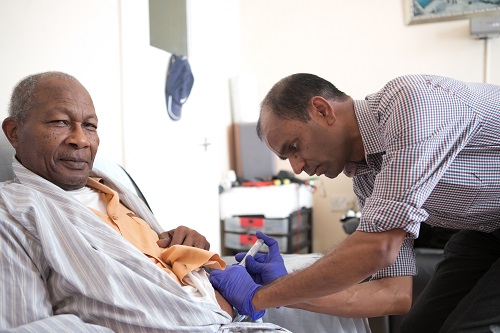20,000 People Get Hospital Care in Their Own Homes

18 Jan 2023
Full story
Our Virtual Ward cares for patients who would normally receive hospital care, but can stay at home where they are visited by community nurses and other healthcare professionals and whilst their care is overseen by a consultant. The service has helped to keep more than twenty thousand people at home and therefore safely out of beds at our hospital, keeping those beds free for those who need them most.
This winter, in response to the increased demands on urgent and emergency care services, the service now has 20 ‘beds’ up from 8 and we will be adding 20 more remote monitoring virtual beds over the coming weeks as part of an North Central London Integrated Care System pilot. This means that rather than being able to care for 8 patients a day, the Trust can currently see 20 of its patients a day and in the future, with the addition of remote monitoring technology more than 40.
The Virtual Ward Service works in partnership with colleagues in the hospital’s emergency department, medical assessment unit, the Trust’s community teams and with Social Services teams across North Central London. It is made up of a ‘multidisciplinary team’ – clinical experts from a range of different fields, including GPs, community nurses, occupational therapists, physiotherapists, carers, healthcare assistants and ambulatory or emergency care consultants.
The service is not only freeing up hospital capacity but can actually be safer for patients overall.
Dr Clare Dollery, Medical Director for Whittington Health NHS Trust said: “Hospital is not the best place to care for people who don’t need immediate treatment and we know that no one wants to be in hospital any longer than they really need to be. The virtual ward service allows patients who don’t need to be in hospital but do require a level of support to avoid coming into hospital while still getting the treatment they need to recover.
“We are delighted to be collaborating with partners across north London in improving patient care and helping to keep patients safely out of hospital over winter.”
One patient who benefited from the service was Edward who has dementia and is cared for by his daughter Pauline, she says the service was much better for her father than having to come into a hospital when he developed a nasty infection, she said: “I do everything I can to keep my Dad out of hospital, I want to avoid it if I possibly can because he is comfortable at home and a lot more independent and mobile in his mind than in reality so it’s not easy for him to go to hospital.” She says that the team went above and beyond to ensure her father was well cared for “Vineeth from Whittington Health came to take a urine sample from Dad when he was poorly, although he was only there to provide medical care he even made dad a snack when he said he was hungry. Vineeth made sure Dad was fed, cleaned and comfortable, and Vineeth went back to the hospital with the test sample that he would otherwise have had to come into the hospital to have.”
The whole NHS is currently very busy caring for patients who need emergency care as well as working incredibly hard to treat the backlog of patients waiting for planned care as quickly and safely as possible. The NHS across North Central London is working together to find innovative solutions such as this to enable it to provide even higher quality, safer and more patient centred solutions to the challenges it faces.
We continue to ask everyone who needs urgent care but when it isn’t life threatening to use other services such as their friendly local pharmacist or visit 111.nhs.uk or call 111 before visiting an Emergency Department. If there is a immediate risk to life you should still call 999 or go straight to your nearest Emergency Department.

